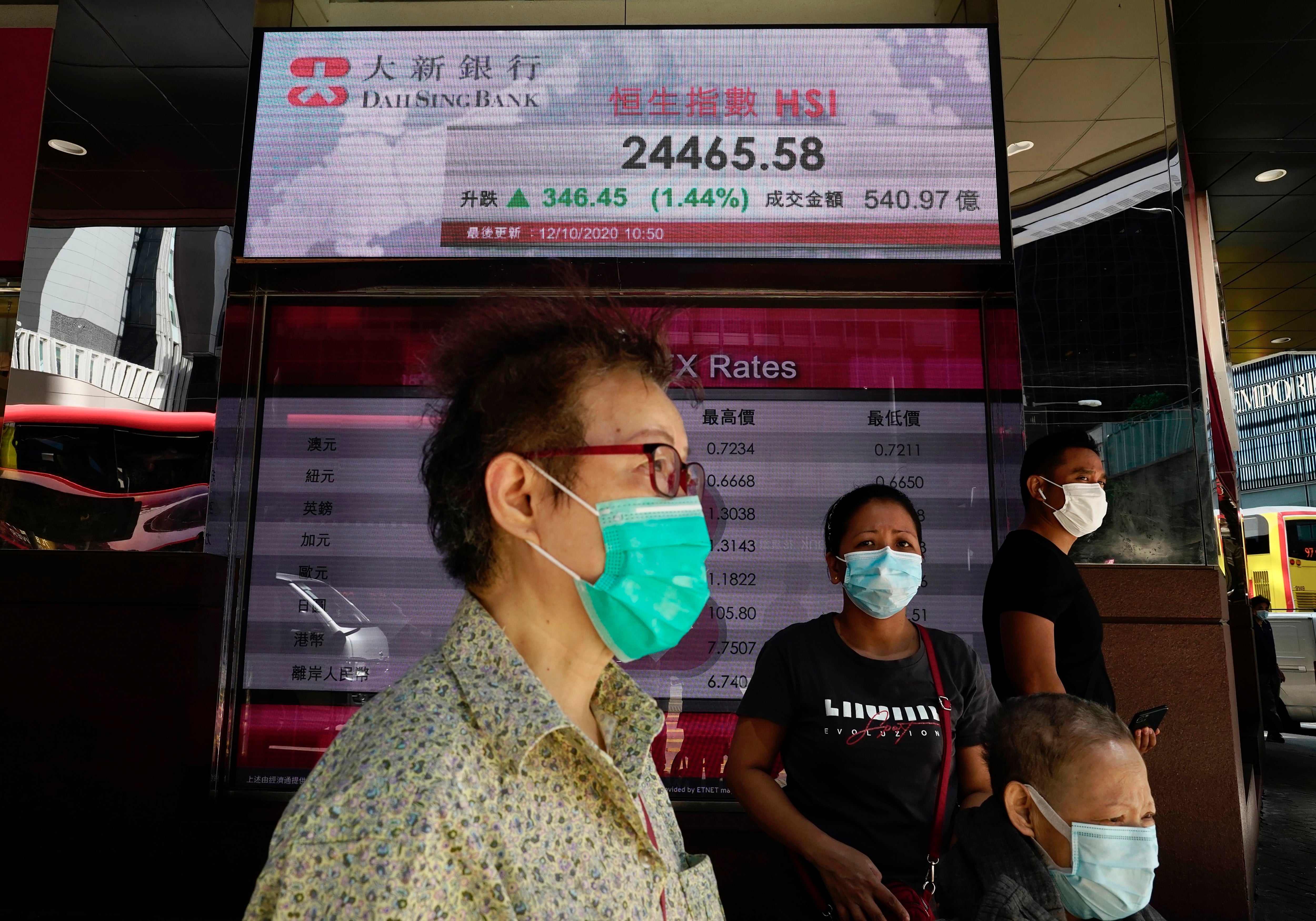Asian shares mostly higher after US rally, aid package hopes
Asian shares are mostly higher in muted trading, as worries about the pandemic keep optimism in check, despite the rally that closed out last week on Wall Street

Your support helps us to tell the story
From reproductive rights to climate change to Big Tech, The Independent is on the ground when the story is developing. Whether it's investigating the financials of Elon Musk's pro-Trump PAC or producing our latest documentary, 'The A Word', which shines a light on the American women fighting for reproductive rights, we know how important it is to parse out the facts from the messaging.
At such a critical moment in US history, we need reporters on the ground. Your donation allows us to keep sending journalists to speak to both sides of the story.
The Independent is trusted by Americans across the entire political spectrum. And unlike many other quality news outlets, we choose not to lock Americans out of our reporting and analysis with paywalls. We believe quality journalism should be available to everyone, paid for by those who can afford it.
Your support makes all the difference.Asian shares were mostly higher in muted trading Monday, as worries about the pandemic kept optimism in check despite a rally that closed out last week on Wall Street
Investors growing wary over upcoming earnings reports have been cashing in recent gains, helping pull Japanese shares lower. Tokyo's benchmark Nikkei 225 index lost 0.3% to 23,543.95. Big exporters logged some of the largest losses, with Toyota Motor Corp. falling 0.6% and Honda Motor Co. shedding 1.8%.
Japan reported core private sector machinery orders edged 0.2% higher in August, contrary to forecasts for a decline. But overall, economic indicators remain weak.
Other regional benchmarks were rising. South Korea's Kospi gained 0.6% to 2,406.87. Australia's S&P/ASX 200 inched up nearly 0.2% to 6,113.40. Hong Kong's Hang Seng jumped 1.3% to 24,434.17, while the Shanghai Composite added 1.7% to 3,325.98.
“While U.S. politics remain center stage, a string of Asia releases and monetary policy meeting decisions will be watched this week,” said Jingyi Pan, senior market strategist at IG in Singapore, referring to central bank meetings in South Korea, Indonesia and Singapore.
Indicators out of China, such as trade and inflation readings also remain on investors' minds.
Wall Street closed out its best week in three months on Friday as negotiations on Capitol Hill aimed at delivering more aid to the ailing U.S. economy encouraged investors. The S&P 500 rose 0.9% to 3,477.14, its third straight gain. The benchmark index ended the week with a 3.8% gain, its strongest rally since early July.
Signs as of late Sunday were not promising. A new White House coronavirus aid proposal got bad reviews from both ends of the political spectrum. House Speaker Nancy Pelosi rejected the most generous Trump administration plan to date as “one step forward, two steps back.” The Republicans who control the Senate are dismissing it as too expensive and a political loser for conservatives.
On Friday the White House increased its offer to $1.8 trillion, up from $1.6 trillion, according to a Republican aide familiar with the plan. Pelosi’s most recent public proposal was about $2.2 trillion, though that included a business tax increase that Republicans won’t go for.
Worries persist that Congress and the White House won’t deliver more support for the economy as it reels from the impact of the pandemic and concerns that stock prices simply got too high during the summer.
Economists say the outlook is grim without such support, and the chair of the Federal Reserve has said repeatedly it will likely be necessary.
The Dow Jones Industrial Average gained 0.6% to 28,586.90, creeping into positive territory for the year. The Nasdaq composite climbed 1.4%, to 11,579.94, while the Russell 2000 index of small-company stocks jumped 0.6% to 1,637.55.
Other major challenges remain, chief among them the still-spreading coronavirus pandemic, highlighted by Trump’s own COVID-19 diagnosis.
In energy trading, benchmark U.S. crude lost 35 cents to $40.25 a barrel in electronic trading on the New York Mercantile Exchange. It lost 59 cents to $40.60 per barrel on Friday.
Brent crude, the international standard, fell 37 cents to $42.48 a barrel.
The U.S. dollar rose to 105.54 Japanese yen from 105.53 yen last Friday. The euro slipped to $1.1821, from $1.1824.